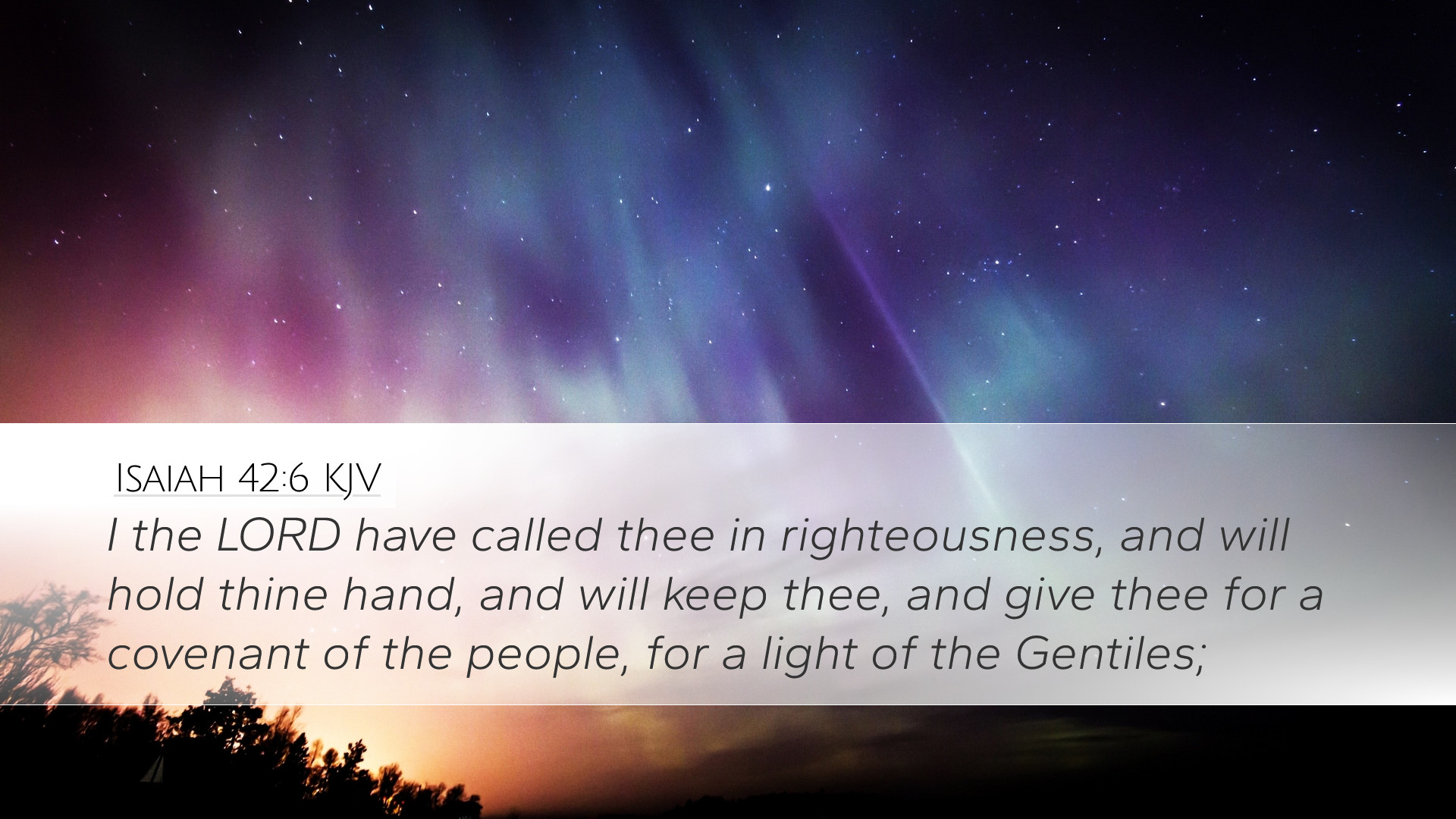Commentary on Isaiah 42:6
Verse: "I the Lord have called thee in righteousness, and will hold thine hand, and will keep thee: and give thee for a covenant of the people, for a light of the Gentiles."
Introduction
This profound verse from the book of Isaiah serves as a pivotal declaration concerning the role of the Servant of the Lord. It encapsulates the divine commissioning of the Servant, highlighting themes of righteousness, guidance, and the covenantal relationship established by God. Insights from notable public domain commentaries, including those by Matthew Henry, Albert Barnes, and Adam Clarke, will elucidate the theological depth and implications of this prophecy.
The Calling of the Servant
Divine Call: The phrase "I the Lord have called thee in righteousness" underscores the sovereignty of God in appointing the Servant. According to Matthew Henry, this call is not arbitrary but rooted in God's eternal purpose, where righteousness signifies both the moral character of God and the mission of the Servant to establish justice.
Righteousness and Holiness: Albert Barnes expands on the notion of righteousness, suggesting that it reflects the ideal relationship the Servant will possess with God and humanity. The Servant is not merely a passive agent but an active participant in God's redemptive plan, embodying righteousness in action.
Divine Preservation and Guidance
Holding of the Hand: The assurance that God "will hold thine hand" conveys divine protection and guidance. Adam Clarke remarks that this imagery suggests the continual support God gives to His chosen Servant, ensuring that the mission is executed with divine help and strength.
- Symbolism of Guidance: Holding hands is a metaphor for intimacy and guidance, indicating that the Servant will not walk alone. God’s presence will empower and direct him in all his endeavors.
- Encouragement for Believers: This aspect encourages believers to trust in God’s guidance in their own lives, as He promises to uphold and direct those who are faithful.
The Covenant Role of the Servant
Covenant for the People: The phrase "and give thee for a covenant of the people" indicates that the Servant embodies the new covenant. Matthew Henry emphasizes that through the Servant, God initiates a renewed relationship with His people, characterized by forgiveness and grace.
Fulfillment in Christ: This prophetic verse finds its ultimate fulfillment in Jesus Christ, who is the New Covenant. Albert Barnes notes that Christ fulfills this role by establishing a redemptive relationship that transcends ethnic boundaries, offering salvation to all, particularly the Gentiles.
A Light to the Gentiles
Light of Revelation: The declaration "for a light of the Gentiles" reveals the universal mission of the Servant. Adam Clarke interprets this as a metaphor for enlightenment and guidance to those in spiritual darkness. The Servant’s role is not confined to Israel but extends to all nations.
- Symbol of Hope: This light signifies hope for the Gentiles, who were often seen as outsiders. It embodies the inclusivity of God’s salvation plan.
- Messianic Implications: In the context of messianic prophecy, this illustrates the intention of God to extend grace and truth beyond the Jewish people to a wider audience.
Theological Reflections
God's Sovereign Grace: This verse speaks profoundly about God's sovereignty and grace. The calling of the Servant reflects God’s initiative in salvation history. Matthew Henry reflects on the assurance that God meticulously orchestrates plans for restoration, revealing His character as one who seeks reconciliation with humanity.
Response of the Believer: The response required from believers is one of faith and obedience. As the Servant is called to righteousness and given strength by God, so too are believers called to live righteously and rely on God's guidance in their lives.
Concluding Thoughts
Isaiah 42:6 serves as a powerful reminder of God's unwavering commitment to His covenant people and the world at large through the Servant. The insights provided by Matthew Henry, Albert Barnes, and Adam Clarke illuminate the multifaceted nature of this verse, emphasizing themes of divine calling, guidance, and the universal scope of salvation. Pastors, students, theologians, and Bible scholars can derive rich theological and practical applications from this prophetic declaration.


